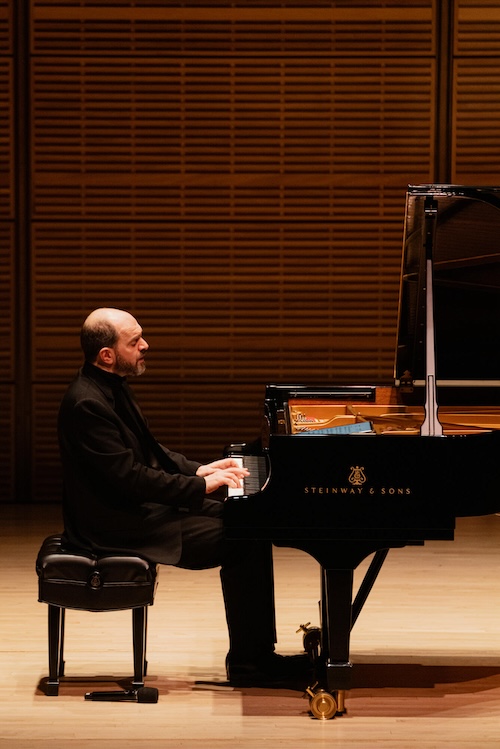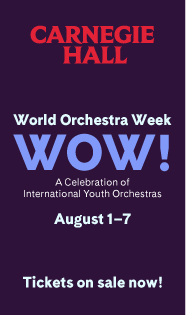Gerstein achieves belated liftoff in flight of piano fantasies
Kirill Gerstein’s piano recital in Carnegie Hall’s Zankel Hall took a while to get off the ground Thursday night. But once it did, the concert offered bracing and illuminating renderings of Romantic piano music, including the era’s touchstone, Frédéric Chopin, at the beginning, middle and end of the program.
A nocturne by Fauré and a polonaise by Liszt paid homage to the Polish master. A sense of fantasy, of music unstructured and flying free, underlay much of the program as well, with two pieces including the word “fantasy” in their titles, four brief pieces titled “intermezzo” (i.e., “in-between” music), and a suggestion of unbuttoned merriment in the title of Schumann’s Faschingsschwank aus Wien (Carnival joke from Vienna).
So, how did pianist Gerstein keep all these associative balls in the air? Not so well at first. Chopin’s Polonaise-Fantaisie in A-flat major, Op. 61, the composer’s most surrealistic, I-saw-Chopin-in-a-dream piece, is now enjoying a vogue on recital programs after decades in the wilderness, but to begin a recital with it is a daring move indeed.
Taking that dare, Gerstein seemed not entirely at ease at the instrument, his touch hard and brittle, just the opposite of what is needed to ride this torrent of Chopinesque emotions. His carefully thought-out performance illustrated the work but didn’t embody it.
Happily, Fauré’s Nocturne in B minor, Op. 119, offered a more familiar arc, from the soft undulations of its opening to the elaborate counterpoints of its central peak. Gerstein’s fine sense of dramatic timing and rubato were much in evidence. His tone remained monochromatic, however, and opportunities to deepen the music with color contrast and layering were missed.
The same strengths and deficiencies were evident in three intermezzi by Francis Poulenc, two from 1934 and the A-flat major from 1943. The first piece bubbled like a gentle toccata, but could have used more tonal contrast between its staccato and singing themes. In the second, a Schumann-like tune danced gracefully in the middle register among syncopated chords and figurations. In the fluent, melodious third Intermezzo, Debussy came to mind as generous pedaling made the music surge and spray.
Following all these intimate but somewhat cool performances, there was something liberating in Franz Liszt’s Polonaise No. 2 in E major, with its quite ridiculous Lisztization of Chopin’s noble genre. The rush of octaves, twinkles of figuration and flurries of extravagant scales seemed to cut loose a sense of pure pianistic fun that transcended all that fretting over color and nuance. The audience seemed to exhale, and rewarded the virtuoso with its warmest applause to that point.
The dam thus broken, Gerstein opened the program’s second half with a compelling performance of Chopin’s Fantasy in F minor, Op. 49, that had plenty of pianistic juice to go with its discursive drama. From the soft, steady march of its opening to swirling efflorescences of scales to a solemn hymn, the music seemed borne along on waves of emotion and fantasy.
The “joke” in Schumann’s Faschingsschwank was more of a riddle: What am I, a sonata in five movements or a suite of brief character pieces à la this composer’s Papillons or Carnaval? Two substantial movements bookended the fleeting Romanze, Scherzino and Intermezzo, a further joke being that only the brilliant finale was actually in sonata form.
Although the Viennese three-to-a-bar of the first movement’s main theme sounded somewhat rushed, Gerstein deftly characterized the many episodes that followed, as well as the gently drooping Romanze, the lighthearted Scherzino, and the impassioned Intermezzo. Shaking the merry music out of his fingers, the pianist played the finale as marked, Höchst lebhaft, lively to the max, to the audience’s delight.
In place of the previously announced program finale, Leopold Godowsky’s virtuoso paraphrase on Die Fledermaus, Gerstein performed two pieces with an encore-like feel: Fritz Kreisler’s “Liebesleid” in a fizzy, elaborate transcription by Rachmaninoff, and Chopin’s dizzy two-against-three Waltz in A-flat major, Op. 42. The former was all rubato and charm; the latter’s metrical joke was blurred by excessive speed, but subsequent episodes had elegant waltz character.
In addition, as a gentle exit, the pianist offered two actual encores: a pair of folk dances in a delicate setting by the Armenian priest, ethnomusicologist and genocide victim Komitas Vardapet; and Debussy’s last composition, “Les Soirs illuminés par l’ardeur du charbon,” a two-minute piece that quietly echoed the composer’s earlier preludes, such as “Les sons et les parfums tournent dans l’air du soir” and “Voiles.”
Carnegie Hall presents pianist Behzod Abduraimov performing works by Franck, Saidaminova, Ravel, Price, and Prokofiev, 8 p.m. Jan. 26. carnegiehall.org

